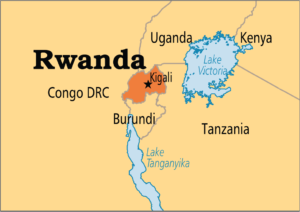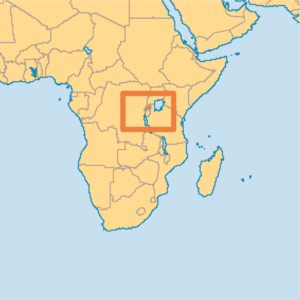OCTOBER 17- TODAY’S READING FROM THE ONE YEAR BIBLE- JEREMIAH 30:1-31:26; 1 TIMOTHY 2:1-15; PSALM 87:1-7; PROVERBS 25:18-19
TODAY’S READING FROM THE OLD TESTAMENT- JEREMIAH 30:1-31:26
 The Lord gives Jeremiah instruction to put down in writing the prophecies he has been given. The sins of God’s people must go on record. The ‘time of Jacob’s trouble’ (Jeremiah 30:7) will be the chastisement for their disobedience. But at the same time, God also wants His promise of their ultimate salvation to go on record. He will punish Judah and Israel for their rebellion. But God will act redemptively, and at the appointed time, He will take their yoke of oppression off from them and restore them to Himself. He will do this ultimately through the Messiah, the promised Son of David (30:9). Although the prophet has their imminent captivity to the Babylonians and their deliverance after 70 years in view, there is a greater tribulation and a greater deliverance that is anticipated by this prophecy— one that will be fulfilled at the end of the age.
The Lord gives Jeremiah instruction to put down in writing the prophecies he has been given. The sins of God’s people must go on record. The ‘time of Jacob’s trouble’ (Jeremiah 30:7) will be the chastisement for their disobedience. But at the same time, God also wants His promise of their ultimate salvation to go on record. He will punish Judah and Israel for their rebellion. But God will act redemptively, and at the appointed time, He will take their yoke of oppression off from them and restore them to Himself. He will do this ultimately through the Messiah, the promised Son of David (30:9). Although the prophet has their imminent captivity to the Babylonians and their deliverance after 70 years in view, there is a greater tribulation and a greater deliverance that is anticipated by this prophecy— one that will be fulfilled at the end of the age.
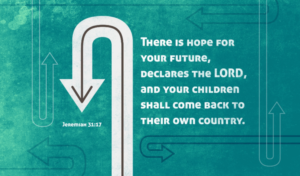 Apart from God’s mercy, His people are without hope. God shows His beloved Israel that He is both just and merciful:
Apart from God’s mercy, His people are without hope. God shows His beloved Israel that He is both just and merciful:
Jeremiah 30:11 11 ‘For I am with you,’ declares the LORD, ‘to save you; For I will destroy completely all the nations where I have scattered you, only I will not destroy you completely. But I will chasten you justly and will by no means leave you unpunished.’
The redemptive work of mercy is described as a removal of the yoke (30:4-11), the healing of their wound (30:12-17), and the calm after the storm (30:18-24). The Messiah will come and will be one of their own. He will be both King and Priest (30:21).
Jeremiah 30:21 21 ‘Their leader shall be one of them, And their ruler shall come forth from their midst; And I will bring him near and he shall approach Me; For who would dare to risk his life to approach Me?’ declares the LORD.
 The restoration of the covenant relationship between God and His chosen people is predicted in Jeremiah 30:17-22. Chapter 31 continues to describe the new covenant that God will make with Israel.
The restoration of the covenant relationship between God and His chosen people is predicted in Jeremiah 30:17-22. Chapter 31 continues to describe the new covenant that God will make with Israel.
Because of the sins of Solomon and the foolishness of Rehoboam, the nation was split in two; the northern kingdom of Israel and the southern kingdom of Judah. But the Lord promises to unite them (31:1, 27-30) as one nation. He will gather His people and rebuild them; they will be the vineyard He originally intended to take pleasure in (31:5).
The names ‘Ephraim,’ ‘Samaria,’ and ‘Israel’ refer to the northern kingdom.
Jeremiah 31:9 9 “With weeping they will come, And by supplication I will lead them; I will make them walk by streams of waters, On a straight path in which they will not stumble; For I am a father to Israel, And Ephraim is My firstborn.”
The northern kingdom was not restored after they were captured in 722 B.C. by the Assyrians. So these promises have yet to be fulfilled. Ephraim will repent and turn to the Lord.
Rachel was the mother of Joseph and Benjamin. Joseph was the father of Ephraim and Manasseh, whose tribal territories were in the Northern Kingdom (Genesis 30:22-24). Benjamin’s territory was in the southern kingdom. Jeremiah heard the weeping of the southern tribes at Ramah, as when they assembled as prisoners preparing for their long march into the Babylonian captivity (Jer. 40:1). Rachel had seen all her descendants taken by foreigners.
Jeremiah 31:15 15 Thus says the LORD, “A voice is heard in Ramah, Lamentation and bitter weeping. Rachel is weeping for her children; She refuses to be comforted for her children, because they are no more.”
This verse, Jeremiah 31:15, is quoted in the New Testament when King Herod, in an attempt to be free from the rule of a competitor, the Jewish Messiah, orders the death of all the Hebrew infants.
Matthew 2:16-18 16 Then when Herod saw that he had been tricked by the magi, he became very enraged, and sent and slew all the male children who were in Bethlehem and all its vicinity, from two years old and under, according to the time which he had determined from the magi. 17 Then what had been spoken through Jeremiah the prophet was fulfilled: (Jeremiah 30:15)18 “A VOICE WAS HEARD IN RAMAH, WEEPING AND GREAT MOURNING, RACHEL WEEPING FOR HER CHILDREN; AND SHE REFUSED TO BE COMFORTED, BECAUSE THEY WERE NO MORE.”
But the Lord reminds us that Rachel’s bringing these children to birth was not in vain. He will restore Ephraim and Judah.
Jeremiah 31:16 16 Thus says the LORD, “Restrain your voice from weeping And your eyes from tears; For your work will be rewarded,” declares the LORD, “And they will return from the land of the enemy.
“There is hope for your future!” (31:17)
Jeremiah speaks in the first person in identification with his people:
Jeremiah 31:18b18 “You have chastised me, and I was chastised, like an untrained calf; Bring me back that I may be restored, For You are the LORD my God.”
TODAY’S READING FROM THE NEW TESTAMENT – 1 TIMOTHY 2:1-15
 Paul gives Timothy the charge to get the church praying! Men are to lift their holy hands and intercede. They are to pray for those in positions of authority. They are to pray for good government. What conditions should they pray for? They should pray for a government that enables people to live their lives in peace, where godliness is upheld, and people are treated with dignity. They are to pray for conditions conducive to proclaiming the truth about God:
Paul gives Timothy the charge to get the church praying! Men are to lift their holy hands and intercede. They are to pray for those in positions of authority. They are to pray for good government. What conditions should they pray for? They should pray for a government that enables people to live their lives in peace, where godliness is upheld, and people are treated with dignity. They are to pray for conditions conducive to proclaiming the truth about God:
1 Timothy 2:4-6 4 who desires all men to be saved and to come to the knowledge of the truth. 5 For there is one God, and one mediator also between God and men, the man Christ Jesus, 6 who gave Himself as a ransom for all, the testimony given at the proper time.
 Men should be taught to restrain from attacking one another and instead become prayer warriors, lifting up their holy hands as godly intercessors for their families, their church, their governments, and the lost (1 Timothy 2:8).
Men should be taught to restrain from attacking one another and instead become prayer warriors, lifting up their holy hands as godly intercessors for their families, their church, their governments, and the lost (1 Timothy 2:8).
When people read Paul’s instruction pertaining to the women in the church, he is often misunderstood as a misogynist. We must remember that Paul and Timothy were preaching the gospel at the time when an apostate Judaism and the pagan culture had little respect for women. We read of exceptional women like Mary, the mother of Jesus, and Elizabeth, who displayed piety and prayed with spiritual understanding and familiarity with Scripture. But most women were not encouraged to learn and were restricted from participation in religious services. Women were both dishonored and deified by the Ephesian culture (where they worshiped Artemis, the primary goddess of childbirth and midwifery, the daughter of Zeus, also identified by the Romans as Diana, the huntress). The New Testament church saw that men and women had an equal standing before God as His image-bearers. The women in the Ephesian church, like those in Corinth, became disruptive and distracting in the exercise of their newfound freedoms at their gatherings. Paul acknowledges that women publicly prayed and prophesied (1 Cor 11:5), but he reminded them of important restraints for the purpose of maintaining God’s creation order (Genesis 2). Women were not permitted to teach or to usurp the authority of the male headship in the church. They were to be silent. The word used here for silent is a word that denotes an attitude of self-composure and quietness rather than denoting a gag order of absolute speechlessness. (There are three different Greek words in the New Testament for ‘quiet’ or ‘silence’, each with different shades of meaning. The word used here is ‘hesuchazo; It refers to an absence of disturbance, tranquility arising from within. It does not mean an absolute absence of words, but the absence of controversial speech; Another word ‘sigao’ is used for complete silence.)
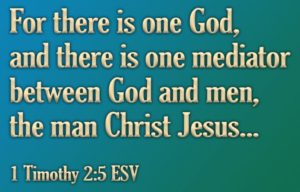 1 Timothy 2:12 12 But I do not allow a woman to teach or exercise authority over a man, but to remain quiet (‘hesuchazo’-quietness; not ‘sigao’- meaning to say nothing).
1 Timothy 2:12 12 But I do not allow a woman to teach or exercise authority over a man, but to remain quiet (‘hesuchazo’-quietness; not ‘sigao’- meaning to say nothing).
Paul mentioned in his letters women who held positions of responsibility in the churches and who were among his co-workers. For example, he commended his co-worker, Priscilla, who, together with her husband, Aquila, instructed Apollos privately, helping him to get a better grasp of the gospel. Phoebe worked in the church (Romans 16:1). Mary, Tryphena, and Tryphosa were among his fellow laborers commended in the letter to the Romans (16:6, 12). Euodia and Syntyche had shared in Paul’s struggle in the cause of the gospel (Philippians 4:2-3).
How is a woman saved ‘through childbearing”? (1 Timothy 2:15). It is important to note that the word ‘saved’ has different meanings. We can be saved from adverse situations and not be speaking specifically of eternal damnation. Certainly, the Scriptures make it clear that we are justified before God by grace alone, through faith alone, in Christ alone, and not by anything we do.
Paul has been speaking of the creation order. In Genesis 3, the woman was deceived, and the man was held responsible. A woman is not permitted to teach or exercise authority over a man, but she is saved from any sense of inferiority or shame, as she is entrusted with an unparalleled responsibility of nurturing the young. The future generations are in her care.
“The One Year Bible Companion” (Tyndale House Publishers) has a good summary of other interpretations of 1 Timothy 2:15:
“There are several ways to understand the phrase, being ‘saved through childbearing’: (1) Man sinned and so men were condemned to painful labor. Woman sinned and so women were condemned to pain in childbearing (Gen 3:16). Both men and women, however, can be saved through trusting Christ and obeying him. (2) Women who fulfill their God-given roles are demonstrating true commitment and obedience to Christ. One of the most important roles for a wife and mother is to care for her family. (3) The childbearing mentioned here refers to the birth of Jesus Christ. Women (and men) are saved spiritually because of the most important birth, that of Christ Himself. (4) From the lessons learned through the trials of childbearing, women can develop qualities that teach them about love, trust, submission, and service.
Part of the good news of the gospel is that redemption restores the complementary roles of men and women as image-bearers of God, each with their unique ministries in this church age.
TODAY’S READING FROM THE BOOK OF PSALMS- PSALM 87:1-7
 This is a psalm about the beautiful city of God (Jerusalem). God’s love is set on the city, and He intends for this place to be the center and foundation for His administration on the earth.
This is a psalm about the beautiful city of God (Jerusalem). God’s love is set on the city, and He intends for this place to be the center and foundation for His administration on the earth.
Her former enemies will be born in her. In other words, they will be transformed by the testimony of God displayed in this place.
This psalm pictures the future when all nations will come to Jerusalem to worship (Psalm 86:9; Isaiah 2:1-5), but it is also a picture of the heavenly home ‘in Christ’ where believers have their citizenship (Luke 10:20; Philippians 3:20-21).
Because of the latter interpretation, we can also sing the last verse of this Psalm- “All my springs of joy are in You (Christ, our eternal home)!” (Psalm 87:7).
TODAY’S READING FROM THE BOOK OF PROVERBS- PROVERBS 25:18-19
Proverbs 25:18-19 18 Like a club and a sword and a sharp arrow Is a man who bears false witness against his neighbor. 19 Like a bad tooth and an unsteady foot is confidence in a faithless man in time of trouble.
These proverbs inspire us to be faithful friends and neighbors, and to be careful to choose our friends wisely. A bad tooth is a constant pain, and a bad foot hinders your ability to walk without falling! Those who fail to keep their commitments are useless when you need them. Like a toothache ,they can cause you pain, and like an unstable foot, they take you down if you are not careful.
PRAY FOR THE NATIONS
Republic of Rwanda
Africa
Geography
A fertile, mountainous country similar to its southern neighbor, Burundi.
Population: 10,277,212 Annual Growth: 2.71%
Capital: Kigali
Urbanites: 18.9%
HDI Rank: 167 of 182 (UN Human Development Reports 2009)
Peoples
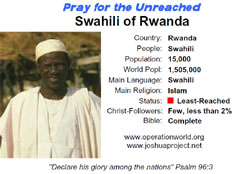 Peoples: 13 (23% unreached)
Peoples: 13 (23% unreached)
Unreached Peoples Prayer Card
Official language: French, English, Kinyarwanda. The entire population speaks Kinyarwanda Languages: 5 All languages
Religion
Largest Religion: Christian
|
Religion |
|
Pop % |
Ann Gr |
|
9,159,051 |
89.12 |
2.7 |
|
|
2,761,140 |
26.9 |
3.0 |
Answer to Prayer
Rwanda has made great progress in many areas since the tragic events of 1994-95.
a) The nation’s infrastructure was brutalized during the conflicts. Political stability since 2000 allows for rebuilding and developing roads, buildings, government services, water and sanitation, education and communications systems.
b) Financial recovery is encouraging, with Rwanda one of the fastest-growing economies in Africa. The mainstays of national income – tea and coffee – have seen their high quality and significant output restored. Eco-tourism is a burgeoning industry. The stated goal of the nation to cease its dependence on foreign aid is a sign of confidence in further growth, but many hurdles remain.
c) The presence of women in leadership. Over half the elected parliament are female, surely a sign of progress, especially since men were the primary perpetrators in the genocides and women mostly victims.
d) Give praise for the commitment to reconcile and peace-build, to move on from the terrible past and toward a brighter future. The very fact that efforts are being made in a land with centuries of endemic ethnic tension, is cause for praise. Also encouraging is the fact that churches are at the forefront of the movement.
Challenge for Prayer
Rwanda’s longer-term future must eventually move past the events of the 1990s. A development program called Vision 2020 intends to transform Rwanda’s economy, infrastructure and values. Other challenges loom large on the horizon, most notably:
a) Political stability is achieved, yet greater freedoms could still be achieved. Political leadership is strong, but a healthy political opposition movement and a more independent press could make Rwanda even stronger. The government is very sympathetic toward Christianity, but is not without its critics, especially in the areas of freedom of expression, human rights and foreign policy toward the DRC. Righteousness exalts a nation; pray for such a dynamic to characterize Rwanda.
b) The military-political conundrum of relationships among Rwanda, Burundi, Congo-DRC and Uganda remains a challenge. With the activities of rebels and militias, relationships are often strained and rise and fall regularly. Pray for patience, understanding and cooperation to work together for justice and to root out those who would destabilize the region.
c) Rapid population growth and limited land promise to intensify the issue hidden at the root of the massacres. The traditional habit of parceling out inherited land to all offspring created tiny parcels of farmland insufficient to even feed a family. Jealousy and greed were behind countless local episodes of murder and theft during the dark days of 1994-95. The terrible loss of life depopulated much land, but this same issue will inevitably resurface – Rwanda is already Africa’s most densely populated country. Pray that wise solutions might be found to this deep-seated and long-term problem.
PRAYER– Lord, our springs of joy arise from You and Your presence in Your people. We are grateful for the new covenant promises that are fulfilled on our behalf through Jesus Christ. We rejoice, knowing that our sins are forgiven and that You have given to us the gift of Your Holy Spirit. You have given us beauty for ashes and the oil of joy for mourning. You are a faithful promise keeper. Help us to be faithful, reliable, and confident witnesses to the great grace we have received. In Jesus’ Name. Amen.

